Organisational Behaviour: Culture, Motivation & Teams in BBC
VerifiedAdded on 2020/11/12
|16
|4556
|71
Report
AI Summary
This report delves into the organisational behaviour of the British Broadcasting Corporation (BBC), examining the impact of culture, politics, and power on staff behaviour, both historically and in the present day. It evaluates content and process theories of motivation and their application in enhancing individual and team performance within the BBC, alongside exploring how improved motivation contributes to achieving organisational goals. The report identifies and explains different types of teams within the BBC, emphasizing their importance, and discusses the factors that contribute to effective teamwork. Furthermore, it suggests improvements to team performance and productivity using relevant organisational concepts and theories, while also pinpointing the main barriers to effective performance within the BBC. The analysis highlights the significance of organisational culture, power dynamics, and political influences in shaping employee behaviour and overall organisational effectiveness, recommending strategies such as reward power and job enrichment to foster a positive and productive work environment. This document is available on Desklib, a platform offering a wide range of study tools and resources for students.
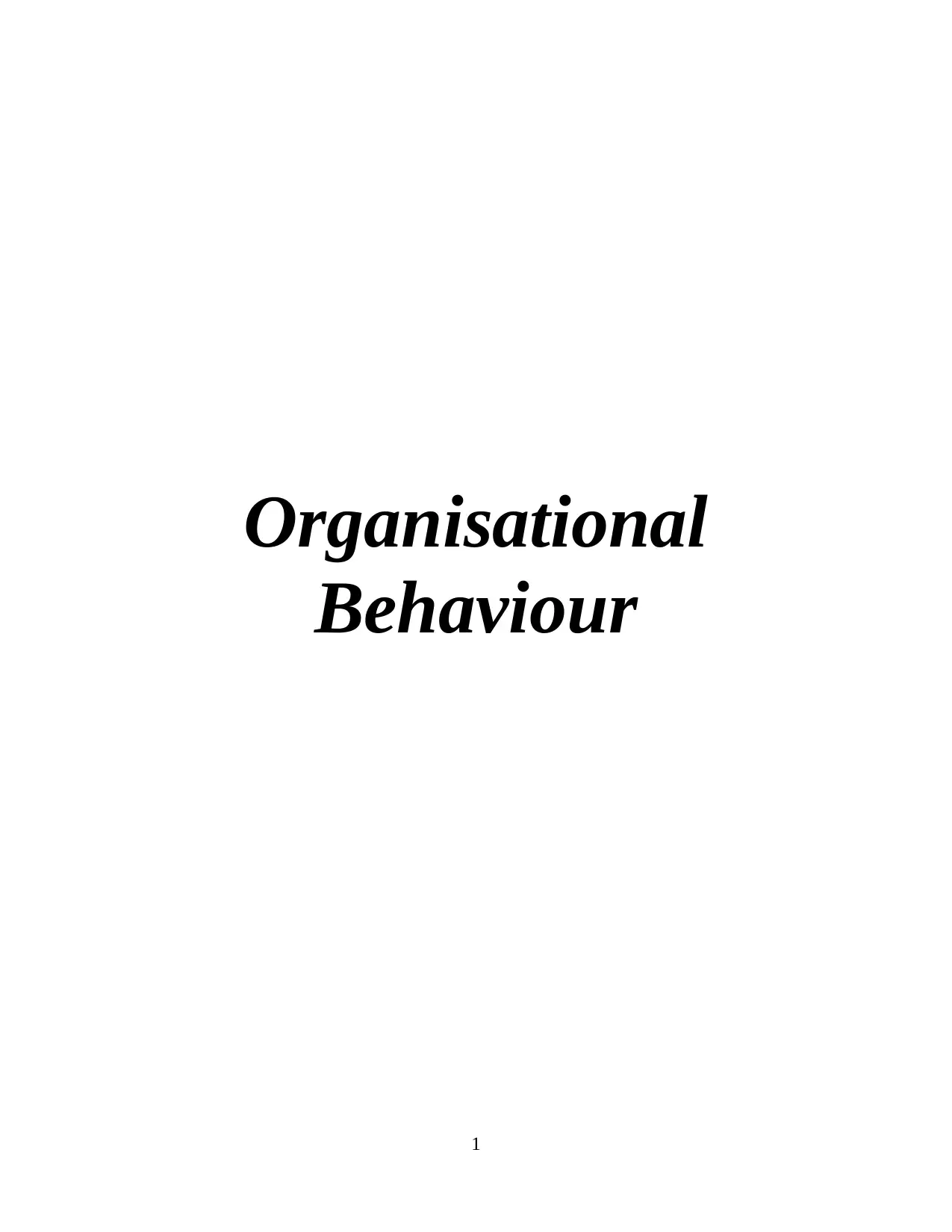
Organisational
Behaviour
1
Behaviour
1
Paraphrase This Document
Need a fresh take? Get an instant paraphrase of this document with our AI Paraphraser
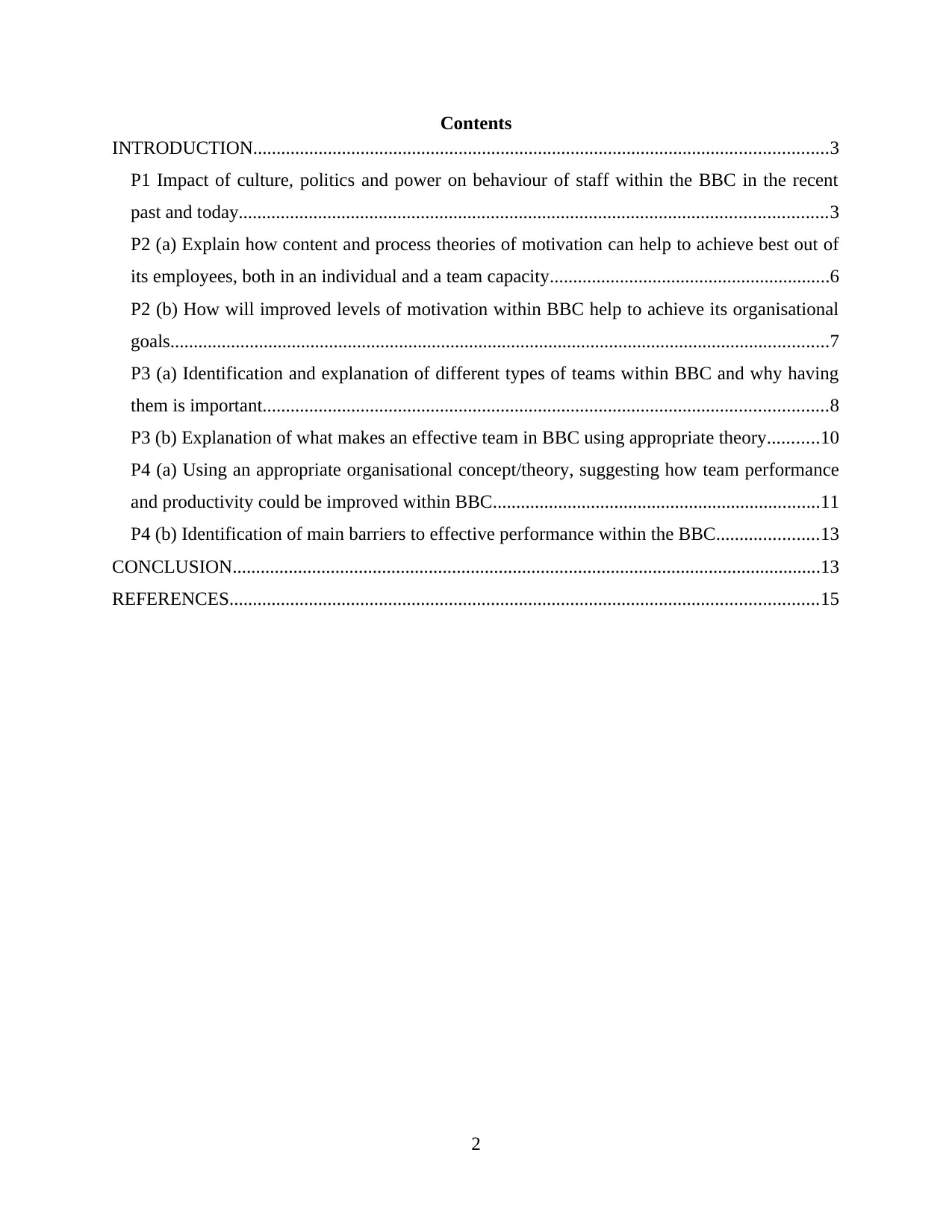
Contents
INTRODUCTION...........................................................................................................................3
P1 Impact of culture, politics and power on behaviour of staff within the BBC in the recent
past and today..............................................................................................................................3
P2 (a) Explain how content and process theories of motivation can help to achieve best out of
its employees, both in an individual and a team capacity............................................................6
P2 (b) How will improved levels of motivation within BBC help to achieve its organisational
goals.............................................................................................................................................7
P3 (a) Identification and explanation of different types of teams within BBC and why having
them is important.........................................................................................................................8
P3 (b) Explanation of what makes an effective team in BBC using appropriate theory...........10
P4 (a) Using an appropriate organisational concept/theory, suggesting how team performance
and productivity could be improved within BBC......................................................................11
P4 (b) Identification of main barriers to effective performance within the BBC......................13
CONCLUSION..............................................................................................................................13
REFERENCES..............................................................................................................................15
2
INTRODUCTION...........................................................................................................................3
P1 Impact of culture, politics and power on behaviour of staff within the BBC in the recent
past and today..............................................................................................................................3
P2 (a) Explain how content and process theories of motivation can help to achieve best out of
its employees, both in an individual and a team capacity............................................................6
P2 (b) How will improved levels of motivation within BBC help to achieve its organisational
goals.............................................................................................................................................7
P3 (a) Identification and explanation of different types of teams within BBC and why having
them is important.........................................................................................................................8
P3 (b) Explanation of what makes an effective team in BBC using appropriate theory...........10
P4 (a) Using an appropriate organisational concept/theory, suggesting how team performance
and productivity could be improved within BBC......................................................................11
P4 (b) Identification of main barriers to effective performance within the BBC......................13
CONCLUSION..............................................................................................................................13
REFERENCES..............................................................................................................................15
2
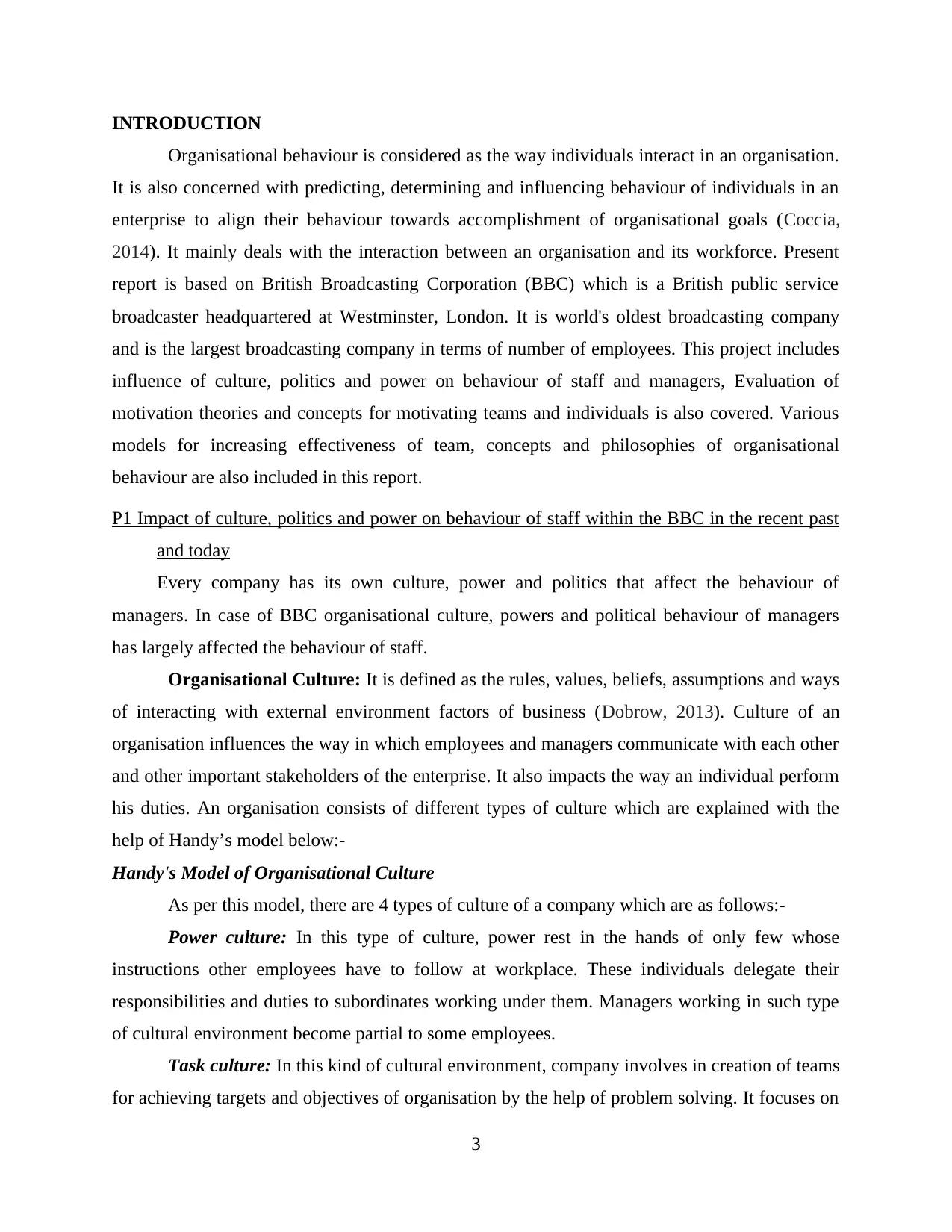
INTRODUCTION
Organisational behaviour is considered as the way individuals interact in an organisation.
It is also concerned with predicting, determining and influencing behaviour of individuals in an
enterprise to align their behaviour towards accomplishment of organisational goals (Coccia,
2014). It mainly deals with the interaction between an organisation and its workforce. Present
report is based on British Broadcasting Corporation (BBC) which is a British public service
broadcaster headquartered at Westminster, London. It is world's oldest broadcasting company
and is the largest broadcasting company in terms of number of employees. This project includes
influence of culture, politics and power on behaviour of staff and managers, Evaluation of
motivation theories and concepts for motivating teams and individuals is also covered. Various
models for increasing effectiveness of team, concepts and philosophies of organisational
behaviour are also included in this report.
P1 Impact of culture, politics and power on behaviour of staff within the BBC in the recent past
and today
Every company has its own culture, power and politics that affect the behaviour of
managers. In case of BBC organisational culture, powers and political behaviour of managers
has largely affected the behaviour of staff.
Organisational Culture: It is defined as the rules, values, beliefs, assumptions and ways
of interacting with external environment factors of business (Dobrow, 2013). Culture of an
organisation influences the way in which employees and managers communicate with each other
and other important stakeholders of the enterprise. It also impacts the way an individual perform
his duties. An organisation consists of different types of culture which are explained with the
help of Handy’s model below:-
Handy's Model of Organisational Culture
As per this model, there are 4 types of culture of a company which are as follows:-
Power culture: In this type of culture, power rest in the hands of only few whose
instructions other employees have to follow at workplace. These individuals delegate their
responsibilities and duties to subordinates working under them. Managers working in such type
of cultural environment become partial to some employees.
Task culture: In this kind of cultural environment, company involves in creation of teams
for achieving targets and objectives of organisation by the help of problem solving. It focuses on
3
Organisational behaviour is considered as the way individuals interact in an organisation.
It is also concerned with predicting, determining and influencing behaviour of individuals in an
enterprise to align their behaviour towards accomplishment of organisational goals (Coccia,
2014). It mainly deals with the interaction between an organisation and its workforce. Present
report is based on British Broadcasting Corporation (BBC) which is a British public service
broadcaster headquartered at Westminster, London. It is world's oldest broadcasting company
and is the largest broadcasting company in terms of number of employees. This project includes
influence of culture, politics and power on behaviour of staff and managers, Evaluation of
motivation theories and concepts for motivating teams and individuals is also covered. Various
models for increasing effectiveness of team, concepts and philosophies of organisational
behaviour are also included in this report.
P1 Impact of culture, politics and power on behaviour of staff within the BBC in the recent past
and today
Every company has its own culture, power and politics that affect the behaviour of
managers. In case of BBC organisational culture, powers and political behaviour of managers
has largely affected the behaviour of staff.
Organisational Culture: It is defined as the rules, values, beliefs, assumptions and ways
of interacting with external environment factors of business (Dobrow, 2013). Culture of an
organisation influences the way in which employees and managers communicate with each other
and other important stakeholders of the enterprise. It also impacts the way an individual perform
his duties. An organisation consists of different types of culture which are explained with the
help of Handy’s model below:-
Handy's Model of Organisational Culture
As per this model, there are 4 types of culture of a company which are as follows:-
Power culture: In this type of culture, power rest in the hands of only few whose
instructions other employees have to follow at workplace. These individuals delegate their
responsibilities and duties to subordinates working under them. Managers working in such type
of cultural environment become partial to some employees.
Task culture: In this kind of cultural environment, company involves in creation of teams
for achieving targets and objectives of organisation by the help of problem solving. It focuses on
3
⊘ This is a preview!⊘
Do you want full access?
Subscribe today to unlock all pages.

Trusted by 1+ million students worldwide
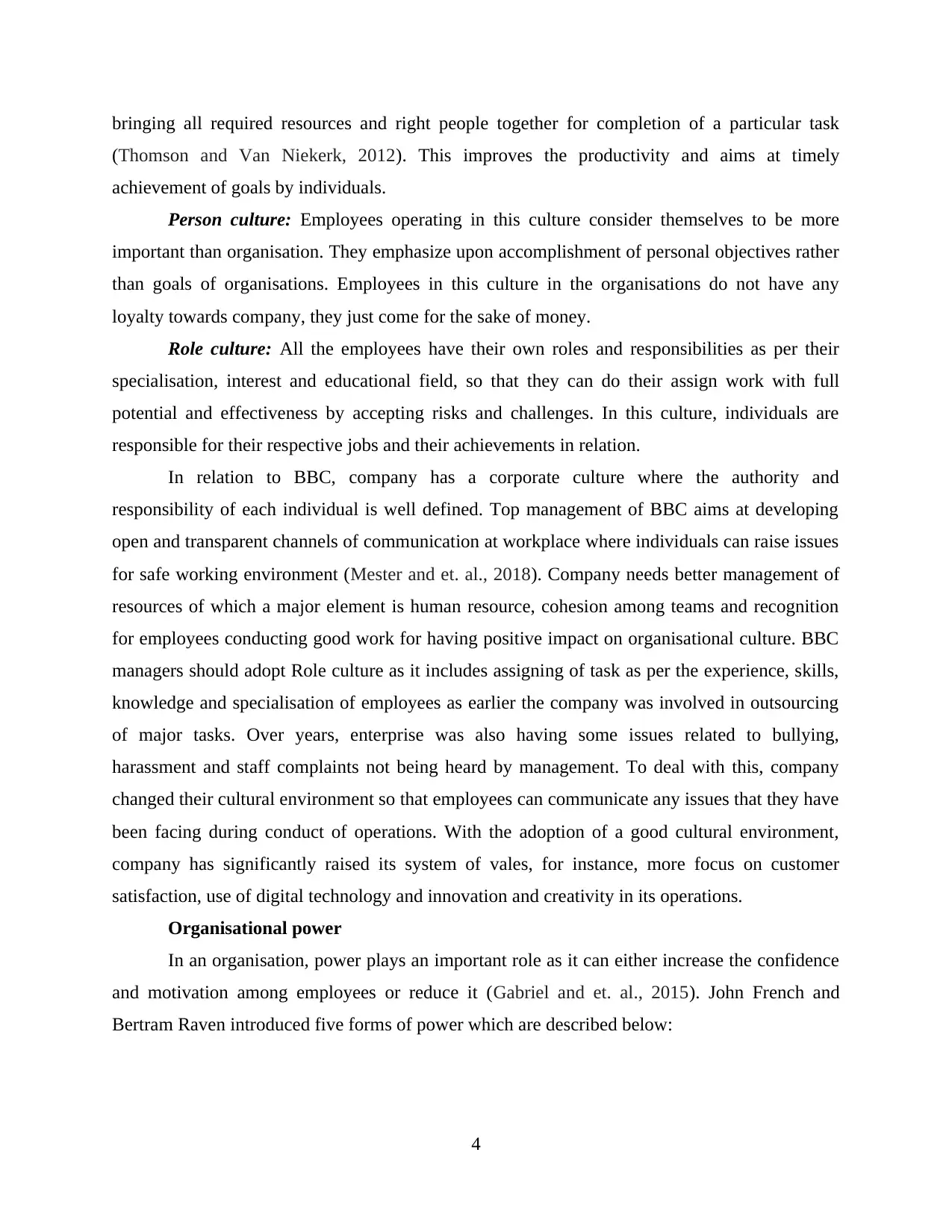
bringing all required resources and right people together for completion of a particular task
(Thomson and Van Niekerk, 2012). This improves the productivity and aims at timely
achievement of goals by individuals.
Person culture: Employees operating in this culture consider themselves to be more
important than organisation. They emphasize upon accomplishment of personal objectives rather
than goals of organisations. Employees in this culture in the organisations do not have any
loyalty towards company, they just come for the sake of money.
Role culture: All the employees have their own roles and responsibilities as per their
specialisation, interest and educational field, so that they can do their assign work with full
potential and effectiveness by accepting risks and challenges. In this culture, individuals are
responsible for their respective jobs and their achievements in relation.
In relation to BBC, company has a corporate culture where the authority and
responsibility of each individual is well defined. Top management of BBC aims at developing
open and transparent channels of communication at workplace where individuals can raise issues
for safe working environment (Mester and et. al., 2018). Company needs better management of
resources of which a major element is human resource, cohesion among teams and recognition
for employees conducting good work for having positive impact on organisational culture. BBC
managers should adopt Role culture as it includes assigning of task as per the experience, skills,
knowledge and specialisation of employees as earlier the company was involved in outsourcing
of major tasks. Over years, enterprise was also having some issues related to bullying,
harassment and staff complaints not being heard by management. To deal with this, company
changed their cultural environment so that employees can communicate any issues that they have
been facing during conduct of operations. With the adoption of a good cultural environment,
company has significantly raised its system of vales, for instance, more focus on customer
satisfaction, use of digital technology and innovation and creativity in its operations.
Organisational power
In an organisation, power plays an important role as it can either increase the confidence
and motivation among employees or reduce it (Gabriel and et. al., 2015). John French and
Bertram Raven introduced five forms of power which are described below:
4
(Thomson and Van Niekerk, 2012). This improves the productivity and aims at timely
achievement of goals by individuals.
Person culture: Employees operating in this culture consider themselves to be more
important than organisation. They emphasize upon accomplishment of personal objectives rather
than goals of organisations. Employees in this culture in the organisations do not have any
loyalty towards company, they just come for the sake of money.
Role culture: All the employees have their own roles and responsibilities as per their
specialisation, interest and educational field, so that they can do their assign work with full
potential and effectiveness by accepting risks and challenges. In this culture, individuals are
responsible for their respective jobs and their achievements in relation.
In relation to BBC, company has a corporate culture where the authority and
responsibility of each individual is well defined. Top management of BBC aims at developing
open and transparent channels of communication at workplace where individuals can raise issues
for safe working environment (Mester and et. al., 2018). Company needs better management of
resources of which a major element is human resource, cohesion among teams and recognition
for employees conducting good work for having positive impact on organisational culture. BBC
managers should adopt Role culture as it includes assigning of task as per the experience, skills,
knowledge and specialisation of employees as earlier the company was involved in outsourcing
of major tasks. Over years, enterprise was also having some issues related to bullying,
harassment and staff complaints not being heard by management. To deal with this, company
changed their cultural environment so that employees can communicate any issues that they have
been facing during conduct of operations. With the adoption of a good cultural environment,
company has significantly raised its system of vales, for instance, more focus on customer
satisfaction, use of digital technology and innovation and creativity in its operations.
Organisational power
In an organisation, power plays an important role as it can either increase the confidence
and motivation among employees or reduce it (Gabriel and et. al., 2015). John French and
Bertram Raven introduced five forms of power which are described below:
4
Paraphrase This Document
Need a fresh take? Get an instant paraphrase of this document with our AI Paraphraser
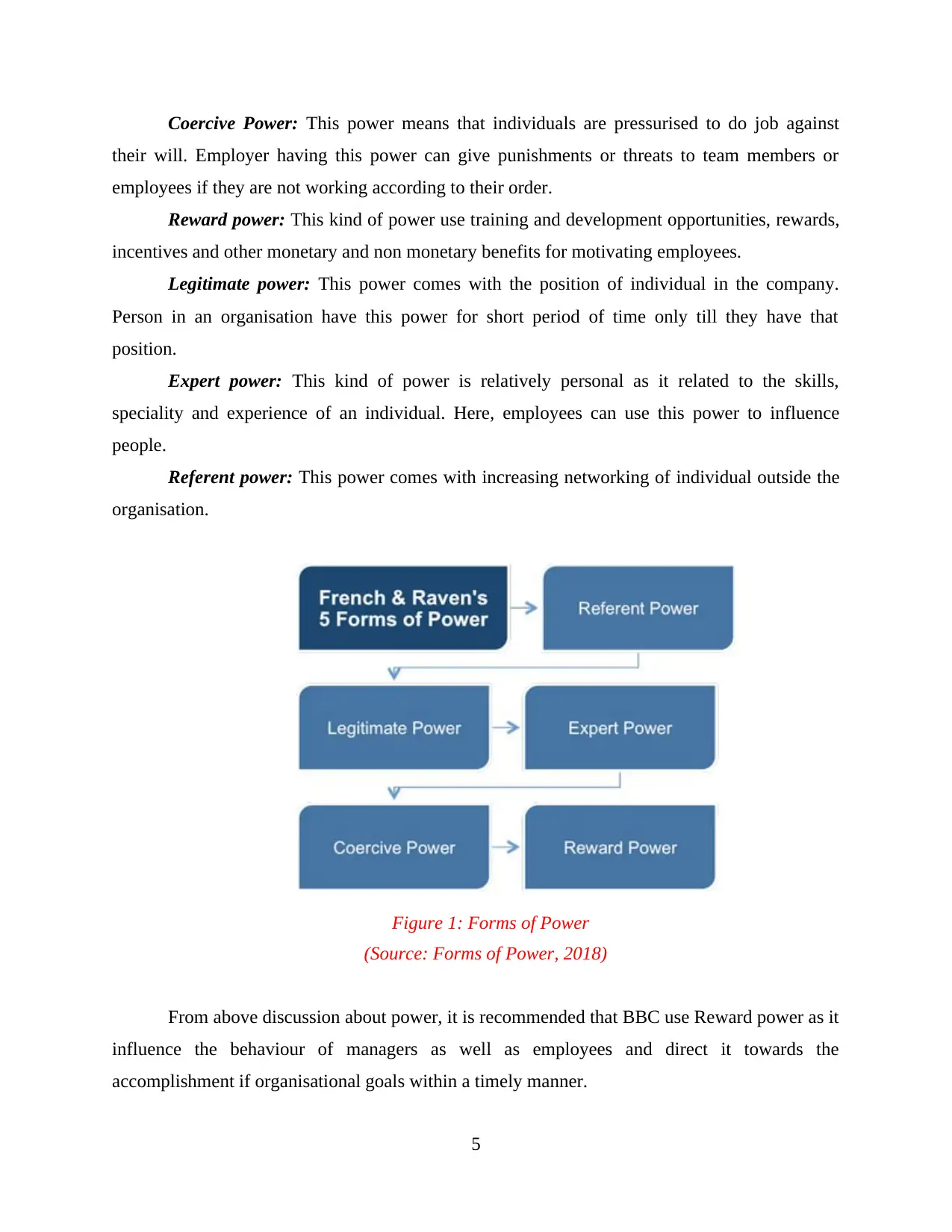
Coercive Power: This power means that individuals are pressurised to do job against
their will. Employer having this power can give punishments or threats to team members or
employees if they are not working according to their order.
Reward power: This kind of power use training and development opportunities, rewards,
incentives and other monetary and non monetary benefits for motivating employees.
Legitimate power: This power comes with the position of individual in the company.
Person in an organisation have this power for short period of time only till they have that
position.
Expert power: This kind of power is relatively personal as it related to the skills,
speciality and experience of an individual. Here, employees can use this power to influence
people.
Referent power: This power comes with increasing networking of individual outside the
organisation.
Figure 1: Forms of Power
(Source: Forms of Power, 2018)
From above discussion about power, it is recommended that BBC use Reward power as it
influence the behaviour of managers as well as employees and direct it towards the
accomplishment if organisational goals within a timely manner.
5
their will. Employer having this power can give punishments or threats to team members or
employees if they are not working according to their order.
Reward power: This kind of power use training and development opportunities, rewards,
incentives and other monetary and non monetary benefits for motivating employees.
Legitimate power: This power comes with the position of individual in the company.
Person in an organisation have this power for short period of time only till they have that
position.
Expert power: This kind of power is relatively personal as it related to the skills,
speciality and experience of an individual. Here, employees can use this power to influence
people.
Referent power: This power comes with increasing networking of individual outside the
organisation.
Figure 1: Forms of Power
(Source: Forms of Power, 2018)
From above discussion about power, it is recommended that BBC use Reward power as it
influence the behaviour of managers as well as employees and direct it towards the
accomplishment if organisational goals within a timely manner.
5
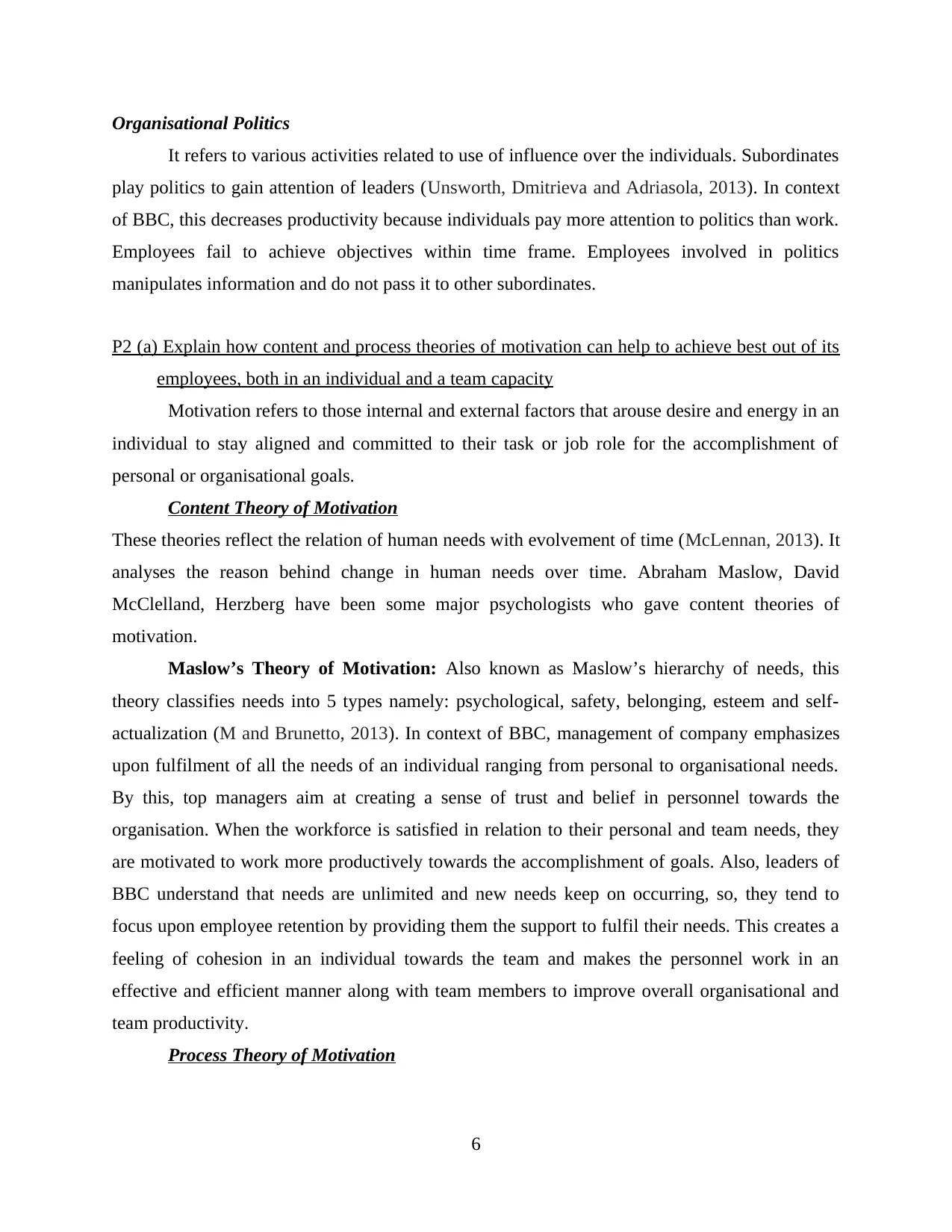
Organisational Politics
It refers to various activities related to use of influence over the individuals. Subordinates
play politics to gain attention of leaders (Unsworth, Dmitrieva and Adriasola, 2013). In context
of BBC, this decreases productivity because individuals pay more attention to politics than work.
Employees fail to achieve objectives within time frame. Employees involved in politics
manipulates information and do not pass it to other subordinates.
P2 (a) Explain how content and process theories of motivation can help to achieve best out of its
employees, both in an individual and a team capacity
Motivation refers to those internal and external factors that arouse desire and energy in an
individual to stay aligned and committed to their task or job role for the accomplishment of
personal or organisational goals.
Content Theory of Motivation
These theories reflect the relation of human needs with evolvement of time (McLennan, 2013). It
analyses the reason behind change in human needs over time. Abraham Maslow, David
McClelland, Herzberg have been some major psychologists who gave content theories of
motivation.
Maslow’s Theory of Motivation: Also known as Maslow’s hierarchy of needs, this
theory classifies needs into 5 types namely: psychological, safety, belonging, esteem and self-
actualization (M and Brunetto, 2013). In context of BBC, management of company emphasizes
upon fulfilment of all the needs of an individual ranging from personal to organisational needs.
By this, top managers aim at creating a sense of trust and belief in personnel towards the
organisation. When the workforce is satisfied in relation to their personal and team needs, they
are motivated to work more productively towards the accomplishment of goals. Also, leaders of
BBC understand that needs are unlimited and new needs keep on occurring, so, they tend to
focus upon employee retention by providing them the support to fulfil their needs. This creates a
feeling of cohesion in an individual towards the team and makes the personnel work in an
effective and efficient manner along with team members to improve overall organisational and
team productivity.
Process Theory of Motivation
6
It refers to various activities related to use of influence over the individuals. Subordinates
play politics to gain attention of leaders (Unsworth, Dmitrieva and Adriasola, 2013). In context
of BBC, this decreases productivity because individuals pay more attention to politics than work.
Employees fail to achieve objectives within time frame. Employees involved in politics
manipulates information and do not pass it to other subordinates.
P2 (a) Explain how content and process theories of motivation can help to achieve best out of its
employees, both in an individual and a team capacity
Motivation refers to those internal and external factors that arouse desire and energy in an
individual to stay aligned and committed to their task or job role for the accomplishment of
personal or organisational goals.
Content Theory of Motivation
These theories reflect the relation of human needs with evolvement of time (McLennan, 2013). It
analyses the reason behind change in human needs over time. Abraham Maslow, David
McClelland, Herzberg have been some major psychologists who gave content theories of
motivation.
Maslow’s Theory of Motivation: Also known as Maslow’s hierarchy of needs, this
theory classifies needs into 5 types namely: psychological, safety, belonging, esteem and self-
actualization (M and Brunetto, 2013). In context of BBC, management of company emphasizes
upon fulfilment of all the needs of an individual ranging from personal to organisational needs.
By this, top managers aim at creating a sense of trust and belief in personnel towards the
organisation. When the workforce is satisfied in relation to their personal and team needs, they
are motivated to work more productively towards the accomplishment of goals. Also, leaders of
BBC understand that needs are unlimited and new needs keep on occurring, so, they tend to
focus upon employee retention by providing them the support to fulfil their needs. This creates a
feeling of cohesion in an individual towards the team and makes the personnel work in an
effective and efficient manner along with team members to improve overall organisational and
team productivity.
Process Theory of Motivation
6
⊘ This is a preview!⊘
Do you want full access?
Subscribe today to unlock all pages.

Trusted by 1+ million students worldwide
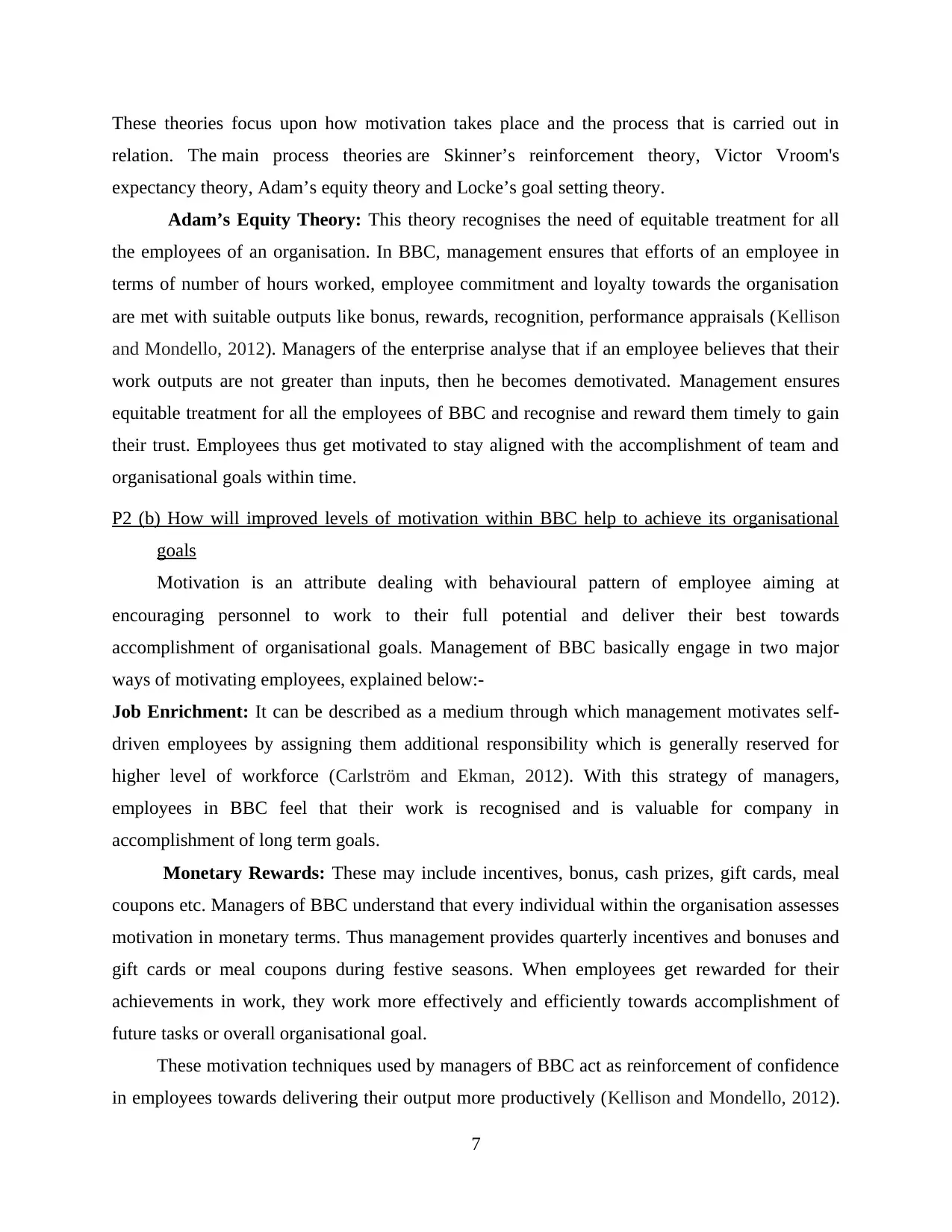
These theories focus upon how motivation takes place and the process that is carried out in
relation. The main process theories are Skinner’s reinforcement theory, Victor Vroom's
expectancy theory, Adam’s equity theory and Locke’s goal setting theory.
Adam’s Equity Theory: This theory recognises the need of equitable treatment for all
the employees of an organisation. In BBC, management ensures that efforts of an employee in
terms of number of hours worked, employee commitment and loyalty towards the organisation
are met with suitable outputs like bonus, rewards, recognition, performance appraisals (Kellison
and Mondello, 2012). Managers of the enterprise analyse that if an employee believes that their
work outputs are not greater than inputs, then he becomes demotivated. Management ensures
equitable treatment for all the employees of BBC and recognise and reward them timely to gain
their trust. Employees thus get motivated to stay aligned with the accomplishment of team and
organisational goals within time.
P2 (b) How will improved levels of motivation within BBC help to achieve its organisational
goals
Motivation is an attribute dealing with behavioural pattern of employee aiming at
encouraging personnel to work to their full potential and deliver their best towards
accomplishment of organisational goals. Management of BBC basically engage in two major
ways of motivating employees, explained below:-
Job Enrichment: It can be described as a medium through which management motivates self-
driven employees by assigning them additional responsibility which is generally reserved for
higher level of workforce (Carlström and Ekman, 2012). With this strategy of managers,
employees in BBC feel that their work is recognised and is valuable for company in
accomplishment of long term goals.
Monetary Rewards: These may include incentives, bonus, cash prizes, gift cards, meal
coupons etc. Managers of BBC understand that every individual within the organisation assesses
motivation in monetary terms. Thus management provides quarterly incentives and bonuses and
gift cards or meal coupons during festive seasons. When employees get rewarded for their
achievements in work, they work more effectively and efficiently towards accomplishment of
future tasks or overall organisational goal.
These motivation techniques used by managers of BBC act as reinforcement of confidence
in employees towards delivering their output more productively (Kellison and Mondello, 2012).
7
relation. The main process theories are Skinner’s reinforcement theory, Victor Vroom's
expectancy theory, Adam’s equity theory and Locke’s goal setting theory.
Adam’s Equity Theory: This theory recognises the need of equitable treatment for all
the employees of an organisation. In BBC, management ensures that efforts of an employee in
terms of number of hours worked, employee commitment and loyalty towards the organisation
are met with suitable outputs like bonus, rewards, recognition, performance appraisals (Kellison
and Mondello, 2012). Managers of the enterprise analyse that if an employee believes that their
work outputs are not greater than inputs, then he becomes demotivated. Management ensures
equitable treatment for all the employees of BBC and recognise and reward them timely to gain
their trust. Employees thus get motivated to stay aligned with the accomplishment of team and
organisational goals within time.
P2 (b) How will improved levels of motivation within BBC help to achieve its organisational
goals
Motivation is an attribute dealing with behavioural pattern of employee aiming at
encouraging personnel to work to their full potential and deliver their best towards
accomplishment of organisational goals. Management of BBC basically engage in two major
ways of motivating employees, explained below:-
Job Enrichment: It can be described as a medium through which management motivates self-
driven employees by assigning them additional responsibility which is generally reserved for
higher level of workforce (Carlström and Ekman, 2012). With this strategy of managers,
employees in BBC feel that their work is recognised and is valuable for company in
accomplishment of long term goals.
Monetary Rewards: These may include incentives, bonus, cash prizes, gift cards, meal
coupons etc. Managers of BBC understand that every individual within the organisation assesses
motivation in monetary terms. Thus management provides quarterly incentives and bonuses and
gift cards or meal coupons during festive seasons. When employees get rewarded for their
achievements in work, they work more effectively and efficiently towards accomplishment of
future tasks or overall organisational goal.
These motivation techniques used by managers of BBC act as reinforcement of confidence
in employees towards delivering their output more productively (Kellison and Mondello, 2012).
7
Paraphrase This Document
Need a fresh take? Get an instant paraphrase of this document with our AI Paraphraser
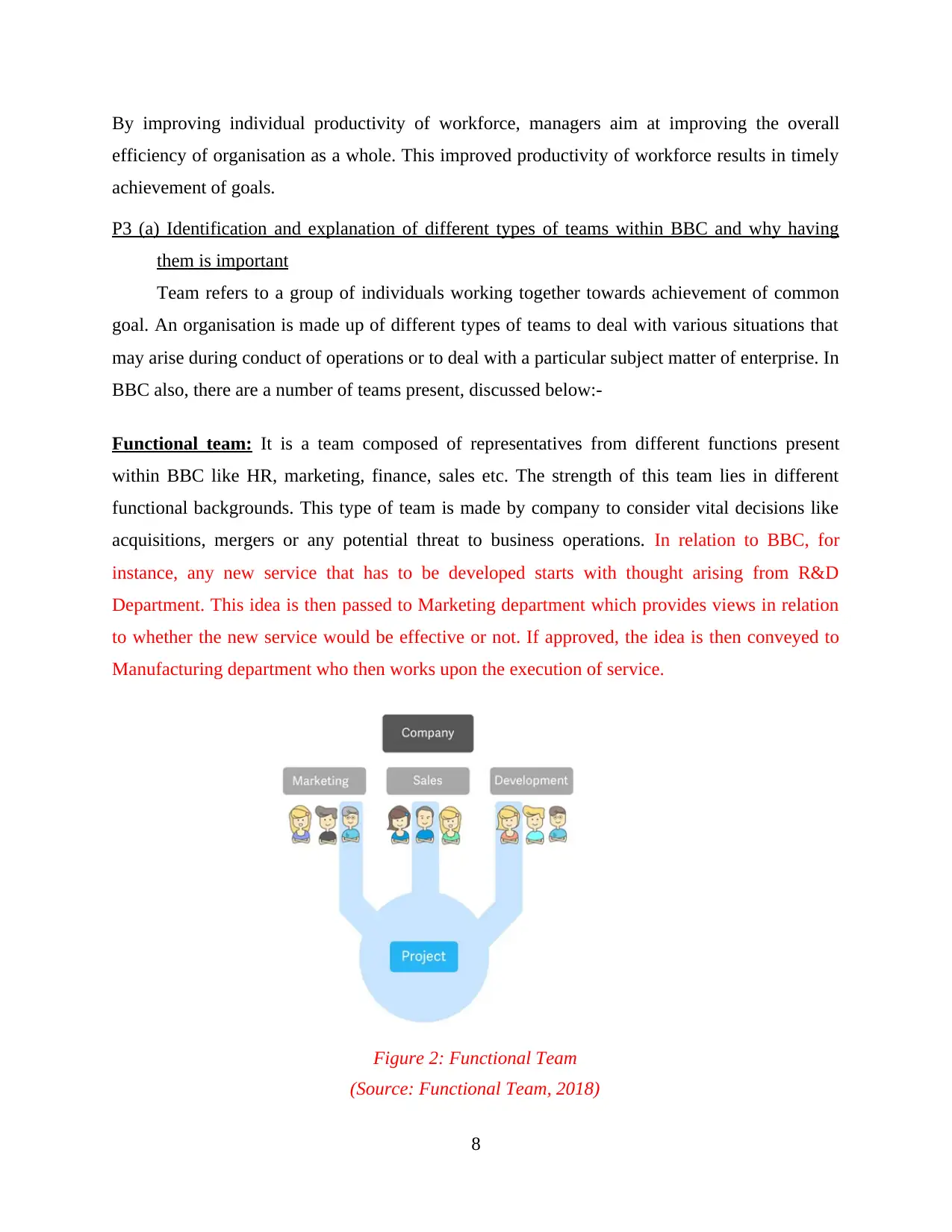
By improving individual productivity of workforce, managers aim at improving the overall
efficiency of organisation as a whole. This improved productivity of workforce results in timely
achievement of goals.
P3 (a) Identification and explanation of different types of teams within BBC and why having
them is important
Team refers to a group of individuals working together towards achievement of common
goal. An organisation is made up of different types of teams to deal with various situations that
may arise during conduct of operations or to deal with a particular subject matter of enterprise. In
BBC also, there are a number of teams present, discussed below:-
Functional team: It is a team composed of representatives from different functions present
within BBC like HR, marketing, finance, sales etc. The strength of this team lies in different
functional backgrounds. This type of team is made by company to consider vital decisions like
acquisitions, mergers or any potential threat to business operations. In relation to BBC, for
instance, any new service that has to be developed starts with thought arising from R&D
Department. This idea is then passed to Marketing department which provides views in relation
to whether the new service would be effective or not. If approved, the idea is then conveyed to
Manufacturing department who then works upon the execution of service.
Figure 2: Functional Team
(Source: Functional Team, 2018)
8
efficiency of organisation as a whole. This improved productivity of workforce results in timely
achievement of goals.
P3 (a) Identification and explanation of different types of teams within BBC and why having
them is important
Team refers to a group of individuals working together towards achievement of common
goal. An organisation is made up of different types of teams to deal with various situations that
may arise during conduct of operations or to deal with a particular subject matter of enterprise. In
BBC also, there are a number of teams present, discussed below:-
Functional team: It is a team composed of representatives from different functions present
within BBC like HR, marketing, finance, sales etc. The strength of this team lies in different
functional backgrounds. This type of team is made by company to consider vital decisions like
acquisitions, mergers or any potential threat to business operations. In relation to BBC, for
instance, any new service that has to be developed starts with thought arising from R&D
Department. This idea is then passed to Marketing department which provides views in relation
to whether the new service would be effective or not. If approved, the idea is then conveyed to
Manufacturing department who then works upon the execution of service.
Figure 2: Functional Team
(Source: Functional Team, 2018)
8
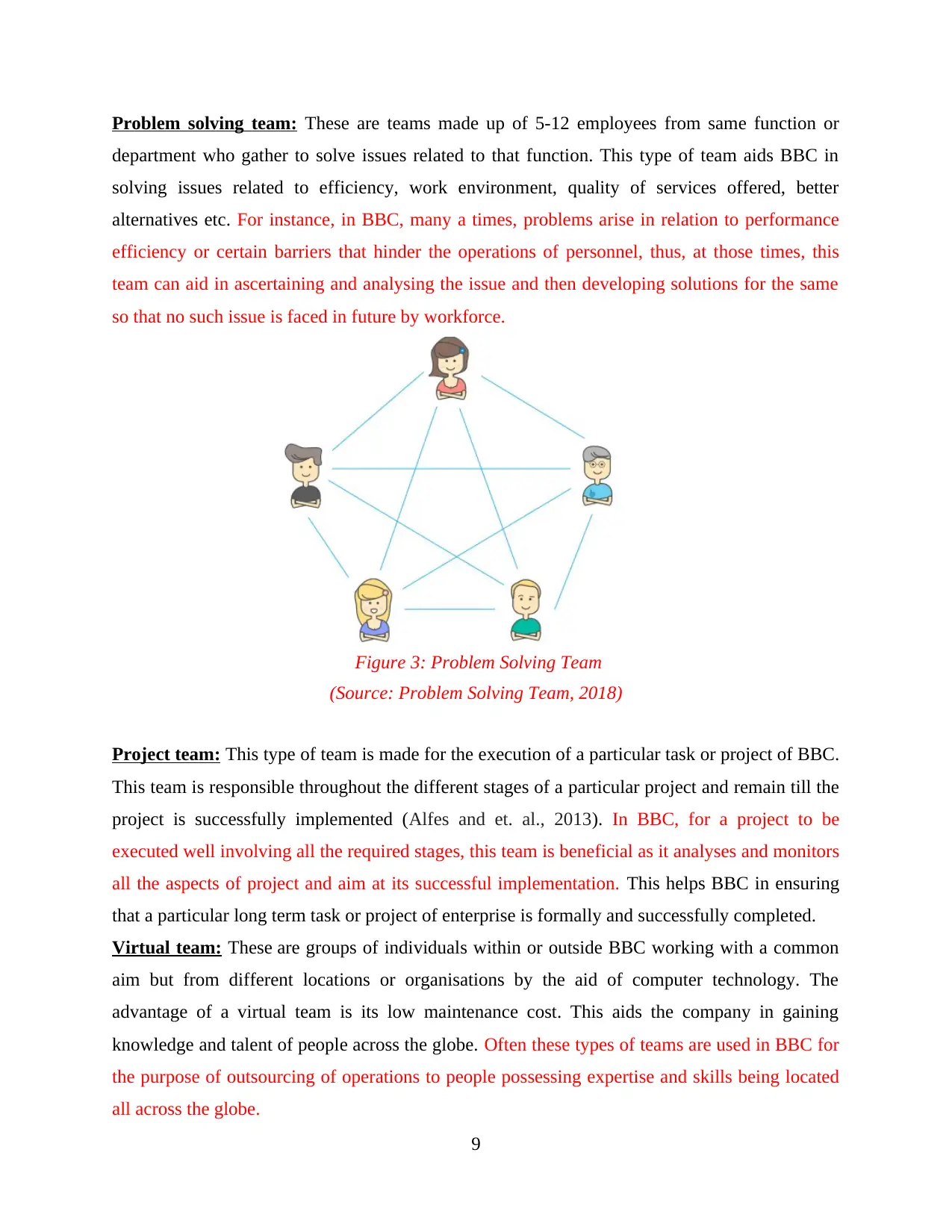
Problem solving team: These are teams made up of 5-12 employees from same function or
department who gather to solve issues related to that function. This type of team aids BBC in
solving issues related to efficiency, work environment, quality of services offered, better
alternatives etc. For instance, in BBC, many a times, problems arise in relation to performance
efficiency or certain barriers that hinder the operations of personnel, thus, at those times, this
team can aid in ascertaining and analysing the issue and then developing solutions for the same
so that no such issue is faced in future by workforce.
Figure 3: Problem Solving Team
(Source: Problem Solving Team, 2018)
Project team: This type of team is made for the execution of a particular task or project of BBC.
This team is responsible throughout the different stages of a particular project and remain till the
project is successfully implemented (Alfes and et. al., 2013). In BBC, for a project to be
executed well involving all the required stages, this team is beneficial as it analyses and monitors
all the aspects of project and aim at its successful implementation. This helps BBC in ensuring
that a particular long term task or project of enterprise is formally and successfully completed.
Virtual team: These are groups of individuals within or outside BBC working with a common
aim but from different locations or organisations by the aid of computer technology. The
advantage of a virtual team is its low maintenance cost. This aids the company in gaining
knowledge and talent of people across the globe. Often these types of teams are used in BBC for
the purpose of outsourcing of operations to people possessing expertise and skills being located
all across the globe.
9
department who gather to solve issues related to that function. This type of team aids BBC in
solving issues related to efficiency, work environment, quality of services offered, better
alternatives etc. For instance, in BBC, many a times, problems arise in relation to performance
efficiency or certain barriers that hinder the operations of personnel, thus, at those times, this
team can aid in ascertaining and analysing the issue and then developing solutions for the same
so that no such issue is faced in future by workforce.
Figure 3: Problem Solving Team
(Source: Problem Solving Team, 2018)
Project team: This type of team is made for the execution of a particular task or project of BBC.
This team is responsible throughout the different stages of a particular project and remain till the
project is successfully implemented (Alfes and et. al., 2013). In BBC, for a project to be
executed well involving all the required stages, this team is beneficial as it analyses and monitors
all the aspects of project and aim at its successful implementation. This helps BBC in ensuring
that a particular long term task or project of enterprise is formally and successfully completed.
Virtual team: These are groups of individuals within or outside BBC working with a common
aim but from different locations or organisations by the aid of computer technology. The
advantage of a virtual team is its low maintenance cost. This aids the company in gaining
knowledge and talent of people across the globe. Often these types of teams are used in BBC for
the purpose of outsourcing of operations to people possessing expertise and skills being located
all across the globe.
9
⊘ This is a preview!⊘
Do you want full access?
Subscribe today to unlock all pages.

Trusted by 1+ million students worldwide
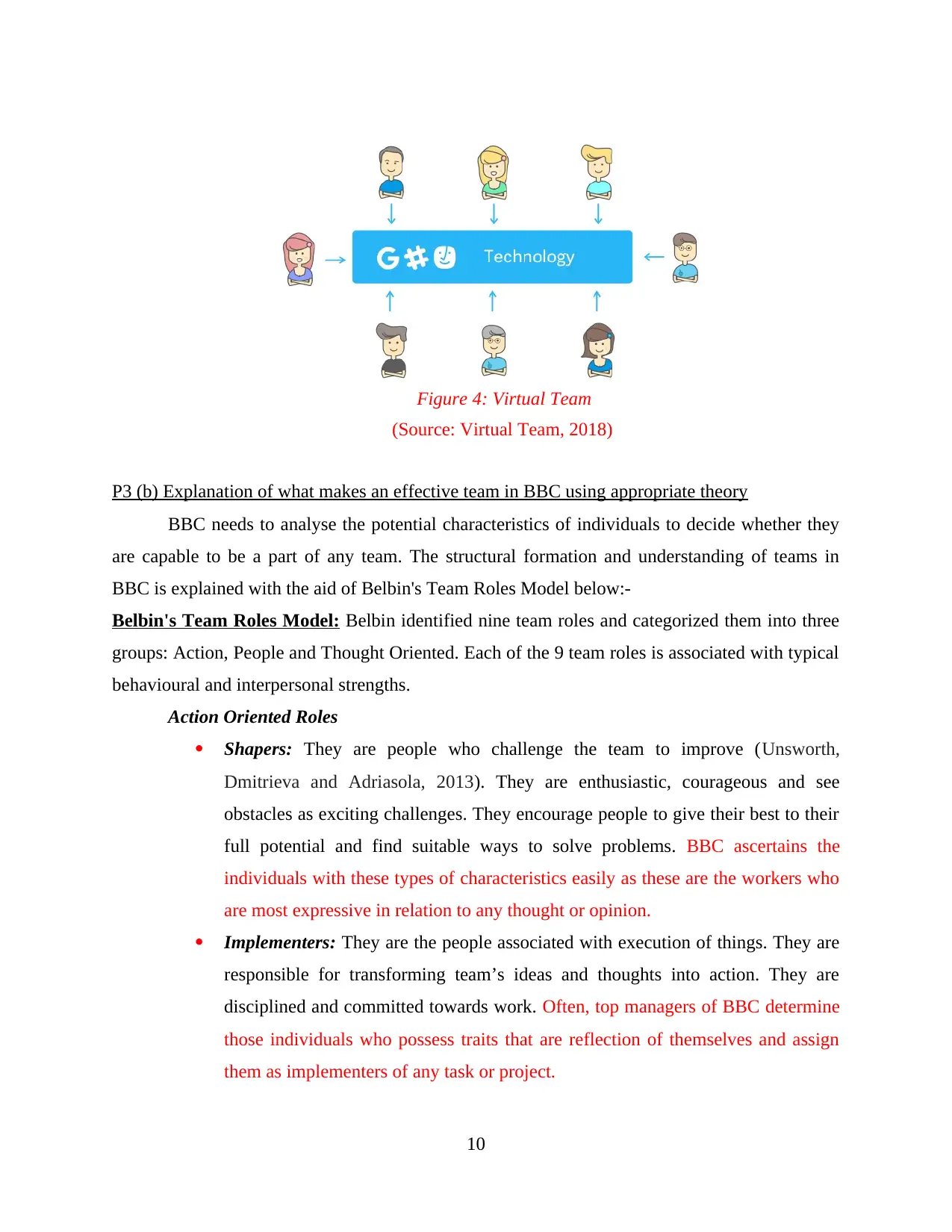
Figure 4: Virtual Team
(Source: Virtual Team, 2018)
P3 (b) Explanation of what makes an effective team in BBC using appropriate theory
BBC needs to analyse the potential characteristics of individuals to decide whether they
are capable to be a part of any team. The structural formation and understanding of teams in
BBC is explained with the aid of Belbin's Team Roles Model below:-
Belbin's Team Roles Model: Belbin identified nine team roles and categorized them into three
groups: Action, People and Thought Oriented. Each of the 9 team roles is associated with typical
behavioural and interpersonal strengths.
Action Oriented Roles
Shapers: They are people who challenge the team to improve (Unsworth,
Dmitrieva and Adriasola, 2013). They are enthusiastic, courageous and see
obstacles as exciting challenges. They encourage people to give their best to their
full potential and find suitable ways to solve problems. BBC ascertains the
individuals with these types of characteristics easily as these are the workers who
are most expressive in relation to any thought or opinion.
Implementers: They are the people associated with execution of things. They are
responsible for transforming team’s ideas and thoughts into action. They are
disciplined and committed towards work. Often, top managers of BBC determine
those individuals who possess traits that are reflection of themselves and assign
them as implementers of any task or project.
10
(Source: Virtual Team, 2018)
P3 (b) Explanation of what makes an effective team in BBC using appropriate theory
BBC needs to analyse the potential characteristics of individuals to decide whether they
are capable to be a part of any team. The structural formation and understanding of teams in
BBC is explained with the aid of Belbin's Team Roles Model below:-
Belbin's Team Roles Model: Belbin identified nine team roles and categorized them into three
groups: Action, People and Thought Oriented. Each of the 9 team roles is associated with typical
behavioural and interpersonal strengths.
Action Oriented Roles
Shapers: They are people who challenge the team to improve (Unsworth,
Dmitrieva and Adriasola, 2013). They are enthusiastic, courageous and see
obstacles as exciting challenges. They encourage people to give their best to their
full potential and find suitable ways to solve problems. BBC ascertains the
individuals with these types of characteristics easily as these are the workers who
are most expressive in relation to any thought or opinion.
Implementers: They are the people associated with execution of things. They are
responsible for transforming team’s ideas and thoughts into action. They are
disciplined and committed towards work. Often, top managers of BBC determine
those individuals who possess traits that are reflection of themselves and assign
them as implementers of any task or project.
10
Paraphrase This Document
Need a fresh take? Get an instant paraphrase of this document with our AI Paraphraser
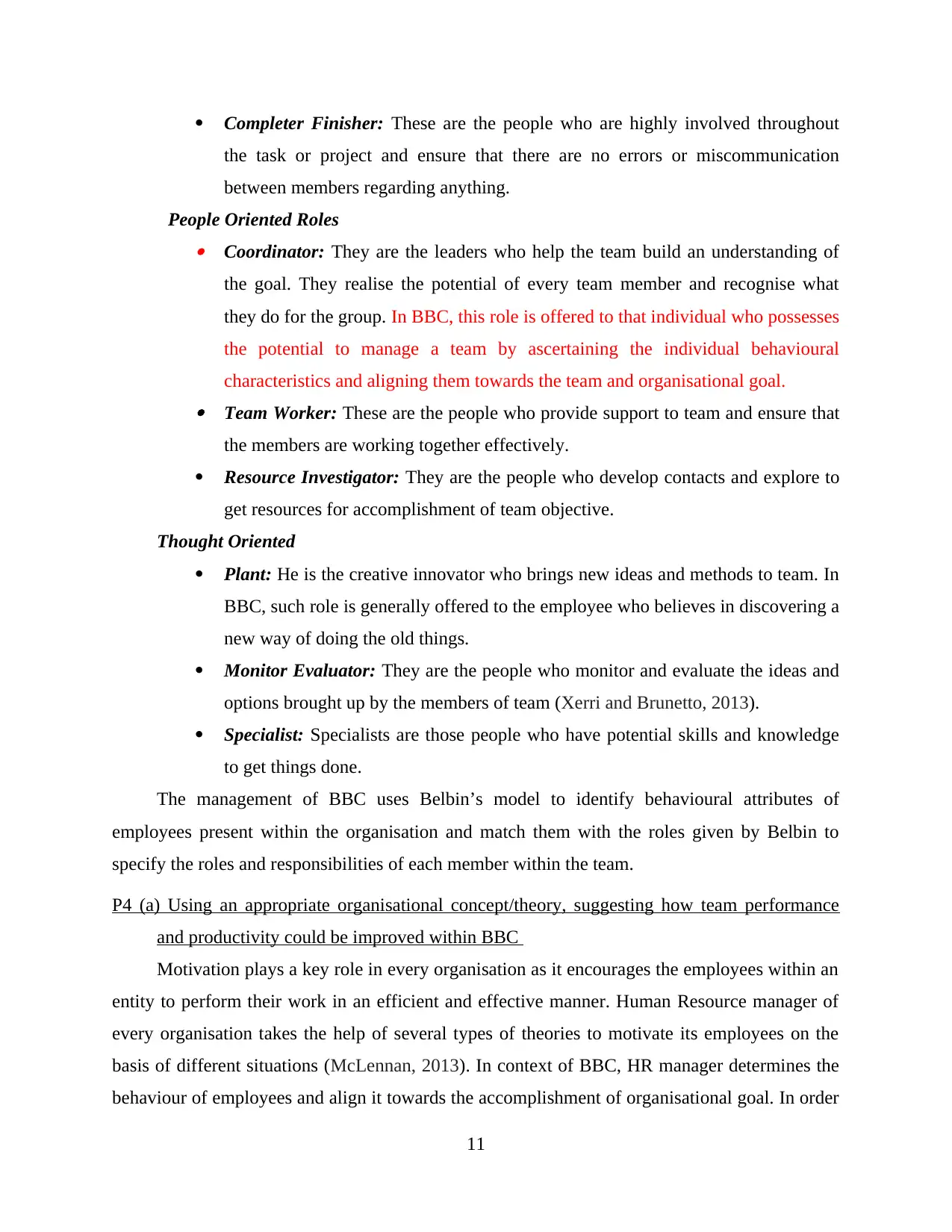
Completer Finisher: These are the people who are highly involved throughout
the task or project and ensure that there are no errors or miscommunication
between members regarding anything.
People Oriented Roles
Coordinator: They are the leaders who help the team build an understanding of
the goal. They realise the potential of every team member and recognise what
they do for the group. In BBC, this role is offered to that individual who possesses
the potential to manage a team by ascertaining the individual behavioural
characteristics and aligning them towards the team and organisational goal.
Team Worker: These are the people who provide support to team and ensure that
the members are working together effectively.
Resource Investigator: They are the people who develop contacts and explore to
get resources for accomplishment of team objective.
Thought Oriented
Plant: He is the creative innovator who brings new ideas and methods to team. In
BBC, such role is generally offered to the employee who believes in discovering a
new way of doing the old things.
Monitor Evaluator: They are the people who monitor and evaluate the ideas and
options brought up by the members of team (Xerri and Brunetto, 2013).
Specialist: Specialists are those people who have potential skills and knowledge
to get things done.
The management of BBC uses Belbin’s model to identify behavioural attributes of
employees present within the organisation and match them with the roles given by Belbin to
specify the roles and responsibilities of each member within the team.
P4 (a) Using an appropriate organisational concept/theory, suggesting how team performance
and productivity could be improved within BBC
Motivation plays a key role in every organisation as it encourages the employees within an
entity to perform their work in an efficient and effective manner. Human Resource manager of
every organisation takes the help of several types of theories to motivate its employees on the
basis of different situations (McLennan, 2013). In context of BBC, HR manager determines the
behaviour of employees and align it towards the accomplishment of organisational goal. In order
11
the task or project and ensure that there are no errors or miscommunication
between members regarding anything.
People Oriented Roles
Coordinator: They are the leaders who help the team build an understanding of
the goal. They realise the potential of every team member and recognise what
they do for the group. In BBC, this role is offered to that individual who possesses
the potential to manage a team by ascertaining the individual behavioural
characteristics and aligning them towards the team and organisational goal.
Team Worker: These are the people who provide support to team and ensure that
the members are working together effectively.
Resource Investigator: They are the people who develop contacts and explore to
get resources for accomplishment of team objective.
Thought Oriented
Plant: He is the creative innovator who brings new ideas and methods to team. In
BBC, such role is generally offered to the employee who believes in discovering a
new way of doing the old things.
Monitor Evaluator: They are the people who monitor and evaluate the ideas and
options brought up by the members of team (Xerri and Brunetto, 2013).
Specialist: Specialists are those people who have potential skills and knowledge
to get things done.
The management of BBC uses Belbin’s model to identify behavioural attributes of
employees present within the organisation and match them with the roles given by Belbin to
specify the roles and responsibilities of each member within the team.
P4 (a) Using an appropriate organisational concept/theory, suggesting how team performance
and productivity could be improved within BBC
Motivation plays a key role in every organisation as it encourages the employees within an
entity to perform their work in an efficient and effective manner. Human Resource manager of
every organisation takes the help of several types of theories to motivate its employees on the
basis of different situations (McLennan, 2013). In context of BBC, HR manager determines the
behaviour of employees and align it towards the accomplishment of organisational goal. In order
11
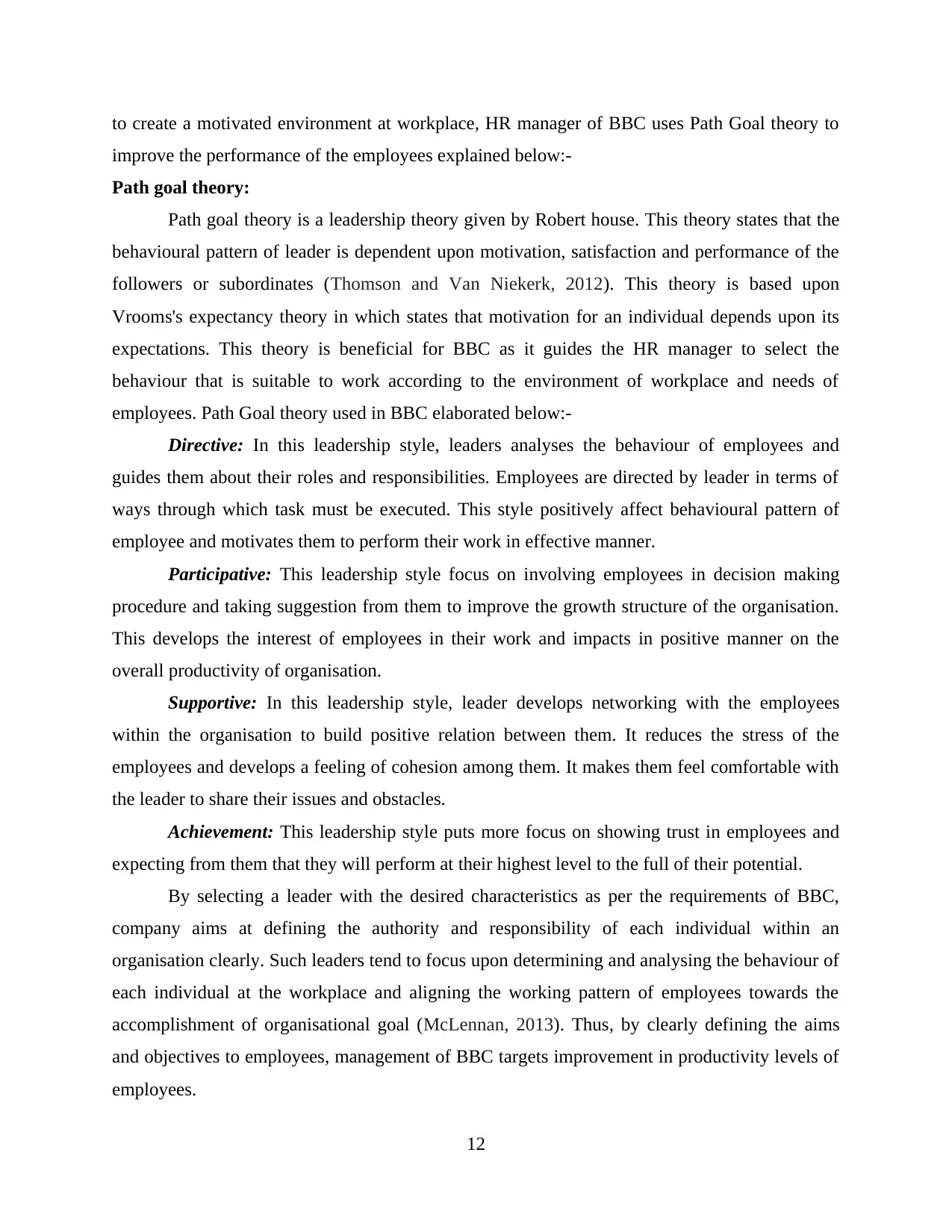
to create a motivated environment at workplace, HR manager of BBC uses Path Goal theory to
improve the performance of the employees explained below:-
Path goal theory:
Path goal theory is a leadership theory given by Robert house. This theory states that the
behavioural pattern of leader is dependent upon motivation, satisfaction and performance of the
followers or subordinates (Thomson and Van Niekerk, 2012). This theory is based upon
Vrooms's expectancy theory in which states that motivation for an individual depends upon its
expectations. This theory is beneficial for BBC as it guides the HR manager to select the
behaviour that is suitable to work according to the environment of workplace and needs of
employees. Path Goal theory used in BBC elaborated below:-
Directive: In this leadership style, leaders analyses the behaviour of employees and
guides them about their roles and responsibilities. Employees are directed by leader in terms of
ways through which task must be executed. This style positively affect behavioural pattern of
employee and motivates them to perform their work in effective manner.
Participative: This leadership style focus on involving employees in decision making
procedure and taking suggestion from them to improve the growth structure of the organisation.
This develops the interest of employees in their work and impacts in positive manner on the
overall productivity of organisation.
Supportive: In this leadership style, leader develops networking with the employees
within the organisation to build positive relation between them. It reduces the stress of the
employees and develops a feeling of cohesion among them. It makes them feel comfortable with
the leader to share their issues and obstacles.
Achievement: This leadership style puts more focus on showing trust in employees and
expecting from them that they will perform at their highest level to the full of their potential.
By selecting a leader with the desired characteristics as per the requirements of BBC,
company aims at defining the authority and responsibility of each individual within an
organisation clearly. Such leaders tend to focus upon determining and analysing the behaviour of
each individual at the workplace and aligning the working pattern of employees towards the
accomplishment of organisational goal (McLennan, 2013). Thus, by clearly defining the aims
and objectives to employees, management of BBC targets improvement in productivity levels of
employees.
12
improve the performance of the employees explained below:-
Path goal theory:
Path goal theory is a leadership theory given by Robert house. This theory states that the
behavioural pattern of leader is dependent upon motivation, satisfaction and performance of the
followers or subordinates (Thomson and Van Niekerk, 2012). This theory is based upon
Vrooms's expectancy theory in which states that motivation for an individual depends upon its
expectations. This theory is beneficial for BBC as it guides the HR manager to select the
behaviour that is suitable to work according to the environment of workplace and needs of
employees. Path Goal theory used in BBC elaborated below:-
Directive: In this leadership style, leaders analyses the behaviour of employees and
guides them about their roles and responsibilities. Employees are directed by leader in terms of
ways through which task must be executed. This style positively affect behavioural pattern of
employee and motivates them to perform their work in effective manner.
Participative: This leadership style focus on involving employees in decision making
procedure and taking suggestion from them to improve the growth structure of the organisation.
This develops the interest of employees in their work and impacts in positive manner on the
overall productivity of organisation.
Supportive: In this leadership style, leader develops networking with the employees
within the organisation to build positive relation between them. It reduces the stress of the
employees and develops a feeling of cohesion among them. It makes them feel comfortable with
the leader to share their issues and obstacles.
Achievement: This leadership style puts more focus on showing trust in employees and
expecting from them that they will perform at their highest level to the full of their potential.
By selecting a leader with the desired characteristics as per the requirements of BBC,
company aims at defining the authority and responsibility of each individual within an
organisation clearly. Such leaders tend to focus upon determining and analysing the behaviour of
each individual at the workplace and aligning the working pattern of employees towards the
accomplishment of organisational goal (McLennan, 2013). Thus, by clearly defining the aims
and objectives to employees, management of BBC targets improvement in productivity levels of
employees.
12
⊘ This is a preview!⊘
Do you want full access?
Subscribe today to unlock all pages.

Trusted by 1+ million students worldwide
1 out of 16
Related Documents
Your All-in-One AI-Powered Toolkit for Academic Success.
+13062052269
info@desklib.com
Available 24*7 on WhatsApp / Email
![[object Object]](/_next/static/media/star-bottom.7253800d.svg)
Unlock your academic potential
Copyright © 2020–2026 A2Z Services. All Rights Reserved. Developed and managed by ZUCOL.





